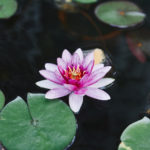Our lives are planted in the murky pond of everyday life, just like a lotus flower grows in a dirty murky swamp. If the lotus flower was moved out into a clean pond, where would it get the nourishment it needs to grow. Then it wouldn’t be able to bloom. Like that the murky pond of everyday life is where we find our nourishment to grow, through the troubles and challenges that come up.
Opposition is Important for Your Growth
Many people complain about their situation, about their problems and about the people they see as causing the problem, who aren’t behaving the way they want them to, or doing what they want. Some just walk out of the situation, thus leaving the pond. They don’t realize that when they leave the situation they are also abandoning their own human revolution. They’ve made the decision to remain the same rather than to grow. They don’t recognize that they need opposition in order to grow. Daisaku Ikeda says, “Without opposition there is no growth.” For Today and Tomorrow 276
Opposition works for our growth very much like the lift off for an airplane. If the plane didn’t have the rushing air under its wings, it couldn’t take off. Like that we need the rushing air of obstacles and opposition to strengthen us and allow us to bring out our inner wisdom and develop an undefeated mind.
This same principle works when we lift weights. The opposition of the weights strengthens our muscles. As Ikeda says, “Nothing can match the strength of those whose lives have bren shaped and forged through challenging and overcoming hardships. Such people fear nothing. The purpose of our Buddhist practice is to develop such strength and fortitude..” For Today and Tomorrow, p.276
What Do You Need to Learn?
Others complain about the other person without ever looking at what they themselves might need to learn through this circumstance.
When we just complain and don’t look at ourselves we are not following the Buddhist way. One of the primary concepts in Buddhism is oneness of self and the environment. Thismeans our lilfe circumstances are createdted from the inside out. We are always connected to the life circumstance we find ourselves in, whether we want to admit it or not.
Many people resent the mud, the circumstance. When you come to realize that it is because of that circumstance, which is exactly what you’ve needed to do your human revolution, then you can stop resenting the mud. When you can regard all the influences in your life, whether difficult or not, as influences to help you grow, then through chanting you will always find a way to use them for your human revolution. When you use them to grow, your obstacles and problems become the stepping stones leading you to enlightenment,
Satori Isumi would say, “Don’t run away and climb out of the pond, abandoning your human revolution. Instead, stay in the pond. It is in the dirty, murky pond where you will learn the lessons of your human revolution.
Your attempts to solve the problem can’t just be focused on the outward situation. In front of the Gohonzon, chant sincere daimoku and be open to what you need to learn through this situation.
An Experience
Mindy was angry with a leader in the organization. She grumbled and was critical. The leader, let’s call her Sally, had no organizing skills and Mindy was a born organizer. A big meeting was coming up and the leader was barely doing anything. Mindy debated with herself, whether to just let the leader fail, in other words leave the pond, or to help her with her own organizing skills.
At this point Mindy was still looking outside of herself and blaming Sally. She hadn’t yet sat down in front of her Gohonzon and really chanted about the situation. One of her good friends in the organization suggested that this would be a situation for Mindy to work on her own human revolution. Gritting her teeth, she sat down to chant about the situation. She rapidly realized that if she didn’t support Sally she was letting down everyone. Mindy used her organizing skills to help make the meeting a success. She and Sally became closer due to Mindy’s support.
One day Sally confided in her that she had almost paralyzing anxiety about calling people on the phone. This had been a lifelong problem. When she realized the challenge this meeting had represented for the leader, Mindy’s heart opened and she had compassion for the challenges Sally had faced. Mindy hadn’t needed to learn how to organize,
but she did need to develop her compassion and let go of her criticalness. Sally need to learn to master her fear and reach out. Everyone involved that situation had needed to learn different things.
Use the Practice to Resolve Difficulties
1. Stay in the pond no matter how much you resent the situation you are in and want to walk out.
2. Remind yourself, this obstacle, this situation provides an opportunity for your human
revolution.
3. Chant daimoku. Be willing to look at yourself and discover what you need to learn.
Remember, when you change, the situation changes.
4. Resolve to turn this poison into medicine.
5. Make good causes. Participate in activities to help others.
Summary:
Today we discussed the fact that enlightenment grows through taking on the challenges we find
in every day life. When faced with a difficult circumstance do we walk out, thereby abandoning
our own human revolution, or do we use it to grow.
Then we examined a n experience where one person was tempted to walk out but stayed thereby
expanding her own life.
Finally we discussed the steps in using the practice to resolve difficulties.
Other vlogs You Might Like:
Do you Know Why You Should Be Grateful for Adversity? https://wp.me/p3V1J9-YS
Why Chanting is Not Magic https://wp.me/p3V1J9-Q5
Did You Know there Are Ten Internal Hindrances to Buddhist Practice? https://wp.me/p3V1J9-NV
Keep the comments coming . I always love to hear from you. See you in two weeeks on Thanksgiving.



